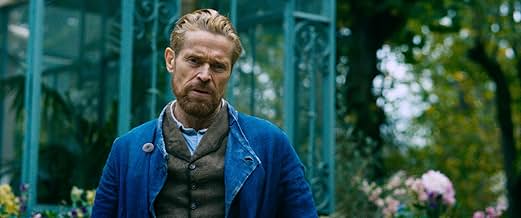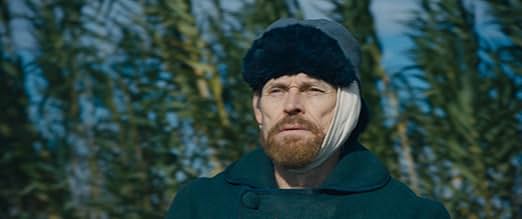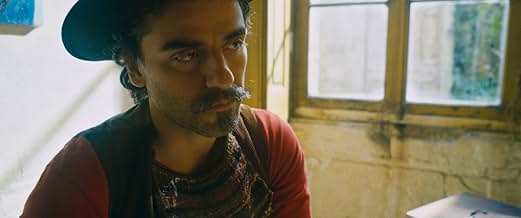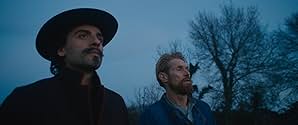Uma olhada a vida do pintor Vincent van Gogh durante o tempo que ele morou en Arles e en Auvers sur Oise na França.Uma olhada a vida do pintor Vincent van Gogh durante o tempo que ele morou en Arles e en Auvers sur Oise na França.Uma olhada a vida do pintor Vincent van Gogh durante o tempo que ele morou en Arles e en Auvers sur Oise na França.
- Direção
- Roteiristas
- Artistas
- Indicado a 1 Oscar
- 3 vitórias e 16 indicações no total
Clément Paul Lhuaire
- Emile Bernard
- (as Clément Lhuaire)
Alan Aubert
- Albert Aurier
- (as Alan Aubert-Carlin)
- …
- Direção
- Roteiristas
- Elenco e equipe completos
- Produção, bilheteria e muito mais no IMDbPro
Avaliações em destaque
This film succeeds in various ways: Dafoe delivers a marvelous portrayal of van Gogh, and Rupert Friend offers a dignified performance as Theo, his brother. The production design, costuming, and lush landscapes are all outstanding. As someone who has seen most of the films directed by Schnabel, I find him an insightful, astute director, yet I wish he would have introduced more nuance into certain scenes.
The invigorating piano score suffers from an overblown volume at various times. At the pre-release screening, more than a handful of people walked out of the film, midway. I think they were overwhelmed by a dizzy combination of loud music and jumpy, blurred camera techniques. As for me, the approach worked, adding a visceral punch.
Some of the dialogue was culled from Vincent's letters to his brother, and Dafoe rendered the text with a vulnerable immediacy. Several roles were aptly cast, but could have benefited from additional screen time: Isaac (as Gauguin), Almaric (Dr. Gachet), and Seigner (Madame Ginoux).
The invigorating piano score suffers from an overblown volume at various times. At the pre-release screening, more than a handful of people walked out of the film, midway. I think they were overwhelmed by a dizzy combination of loud music and jumpy, blurred camera techniques. As for me, the approach worked, adding a visceral punch.
Some of the dialogue was culled from Vincent's letters to his brother, and Dafoe rendered the text with a vulnerable immediacy. Several roles were aptly cast, but could have benefited from additional screen time: Isaac (as Gauguin), Almaric (Dr. Gachet), and Seigner (Madame Ginoux).
AT ETERNITY'S GATE is by no stretch meant to be a pure biography of Van Gogh. I think you need to already be familiar with some of the outlines of his story and it would help to be an appreciator of his work already. What we're really seeing here is director Julian Schnabel's attempt to show us the world as seen through the eyes of Van Gogh. How did he see things and what inspired him. What drove him to madness? What frustrated him in his relations with people? How did he slip into madness (if, indeed, he did)?
Hence, there are a lot of shots of scenery seen through Van Gogh's eyes. I don't know if star Willem Dafoe had a go-pro strapped to his head, or what...but we see walking feet, we see the ground, then the sky, then the landscape...over and over. We see him painting. We see him sitting still and contemplating the land around him. If you can give yourself over to this, it is fairly effective. Instead of wondering when something will happen, just try to experience what you're seeing and hearing. You may be drawn into seeing how Van Gogh saw beauty in the rough landscape around him and how he could NOT stop from painting it in a fever of wanting to catch it before it slipped away. At the same time, these scenes teeter on the edge of tedium.
There are more conventional scenes, to be sure. We see interactions between Van Gogh and Paul Gaughin (Oscar Isaac) and an extensive conversation between Van Gogh and a priest (the excellent Mads Mikkelsen). However, these scenes are full of characters talking about how they see art and the world around them...they speak to each other in lectures. So, the dialogue is not convincing...but it IS interesting. Again, I think it may help to already be interested in Van Gogh.
Scenes with Vincent and his brother Theo (Rupert Friend) are more poignant and personal, along with his interactions with the villagers around him. We see his awkwardness with people and yet feel his need to connect. We get a sense of his crushing poverty. (By the way, Dafoe is WAY too old to be playing this part...but his unusual face actually seems right for the role. No doubt Van Gogh would have been weary and weathered at the end of his life. Dafoe, overall, is pretty darn good here.)
It's an effective movie in many regards, but I tried hard to let myself be completely swept away by it and couldn't quite escape my impatience from time to time.
(I will say that if I were an art teacher; this would be a great film to show my college class. Study the bio of Van Gogh from a textbook, and then show this film. I've never seen a better attempt to put the viewer into the mind, or even psyche, of a great painter. It's a very noble, worthwhile effort. Very much for art lovers, or those wishing to be.)
Hence, there are a lot of shots of scenery seen through Van Gogh's eyes. I don't know if star Willem Dafoe had a go-pro strapped to his head, or what...but we see walking feet, we see the ground, then the sky, then the landscape...over and over. We see him painting. We see him sitting still and contemplating the land around him. If you can give yourself over to this, it is fairly effective. Instead of wondering when something will happen, just try to experience what you're seeing and hearing. You may be drawn into seeing how Van Gogh saw beauty in the rough landscape around him and how he could NOT stop from painting it in a fever of wanting to catch it before it slipped away. At the same time, these scenes teeter on the edge of tedium.
There are more conventional scenes, to be sure. We see interactions between Van Gogh and Paul Gaughin (Oscar Isaac) and an extensive conversation between Van Gogh and a priest (the excellent Mads Mikkelsen). However, these scenes are full of characters talking about how they see art and the world around them...they speak to each other in lectures. So, the dialogue is not convincing...but it IS interesting. Again, I think it may help to already be interested in Van Gogh.
Scenes with Vincent and his brother Theo (Rupert Friend) are more poignant and personal, along with his interactions with the villagers around him. We see his awkwardness with people and yet feel his need to connect. We get a sense of his crushing poverty. (By the way, Dafoe is WAY too old to be playing this part...but his unusual face actually seems right for the role. No doubt Van Gogh would have been weary and weathered at the end of his life. Dafoe, overall, is pretty darn good here.)
It's an effective movie in many regards, but I tried hard to let myself be completely swept away by it and couldn't quite escape my impatience from time to time.
(I will say that if I were an art teacher; this would be a great film to show my college class. Study the bio of Van Gogh from a textbook, and then show this film. I've never seen a better attempt to put the viewer into the mind, or even psyche, of a great painter. It's a very noble, worthwhile effort. Very much for art lovers, or those wishing to be.)
This film tackles the story of an artist creating masterpieces for later generations but not for his own. All the techniques that bothered other reviewers--the handheld camera, loud piano soundtrack, looped dialog--all emphasized a life of loneliness and ridicule that made the audience experience those emotions.
Clearly the story lacked a typical plot, not so much because it wasn't there as much as that Van Gogh's story is so well known and portrayed. I sensed that my companions may have been wishing they had chosen a different movie but for me this film further added to the tapestry of Van Gogh's unique story. Plus the film addresses the two biggest points of contention about him ... his ear and his death ... and suggests that Van Gogh's character traits have turned those into unsolvable mysteries.
Clearly the story lacked a typical plot, not so much because it wasn't there as much as that Van Gogh's story is so well known and portrayed. I sensed that my companions may have been wishing they had chosen a different movie but for me this film further added to the tapestry of Van Gogh's unique story. Plus the film addresses the two biggest points of contention about him ... his ear and his death ... and suggests that Van Gogh's character traits have turned those into unsolvable mysteries.
At Eternity's Gate is an amazing piece of art. I will admit that in order to fully appreciate its artistic offerings one would most definitely need very minor prior knowledge to who Vincent Van Gogh was. What his ideologies were, and the major events of his life, as well as his relationship with his brother. The way lines are repeated multiple times in a way that sounds like an echo chamber to show the audience the way Vincent is perceiving conversation on a delay, rationally speaking. One critique I see a lot is of the very long scenes of Vincent running around in wilderness looking for something to paint, and the overbearing music that surrounds those scenes. I disagree with these critiques but I do understand them. I feel it was necessary to have this music in order for the audience to understand the pure child-like joy Vincent felt while looking for something to paint, and while experiencing nature. I highly recommend this film for any Vincent Van Gogh fans. It is just shy of a perfect movie in my opinion, but I can see why someone would very much disagree with that.
The last years of Vincent van Gogh with his extreme sensitivity and mental instability. It's perfectly filmed with a colorful and adequate staging. And Willem Dafoe plays brilliantly!
Você sabia?
- CuriosidadesWillem Dafoe was 62 when the film was released, 25 years older than Vincent van Gogh, who died at age 37.
- Erros de gravaçãoTheo tells Vincent at the hospital that he is now married. In reality Vincent received a letter from his brother on Dec 23rd 1888, in which he announced his engagement. Vincent feared that his brother would not be able to support him, once married. Additional to this he had the argument with Gaugin that night over Paul leaving. Mentally disturbed by all this he cut his ear off.
- Citações
Vincent Van Gogh: Maybe God made me a painter for people who aren't born yet.
Priest: Possibly.
Vincent Van Gogh: It is said, Life is for sowing. The harvest is not here.
- Cenas durante ou pós-créditosThere's a mid-credits scene, where a Paul Gauguin quote is narrated.
- ConexõesFeatured in Sven Uslings Bio: 2019 Års sämsta biofilmer (2020)
Principais escolhas
Faça login para avaliar e ver a lista de recomendações personalizadas
- How long is At Eternity's Gate?Fornecido pela Alexa
Detalhes
- Data de lançamento
- Países de origem
- Centrais de atendimento oficiais
- Idiomas
- Também conhecido como
- Van Gogh en la puerta de la eternidad
- Locações de filme
- Empresas de produção
- Consulte mais créditos da empresa na IMDbPro
Bilheteria
- Faturamento bruto nos EUA e Canadá
- US$ 2.294.915
- Fim de semana de estreia nos EUA e Canadá
- US$ 92.856
- 18 de nov. de 2018
- Faturamento bruto mundial
- US$ 11.519.666
- Tempo de duração
- 1 h 51 min(111 min)
- Cor
- Proporção
- 2.35 : 1
Contribua para esta página
Sugerir uma alteração ou adicionar conteúdo ausente









































